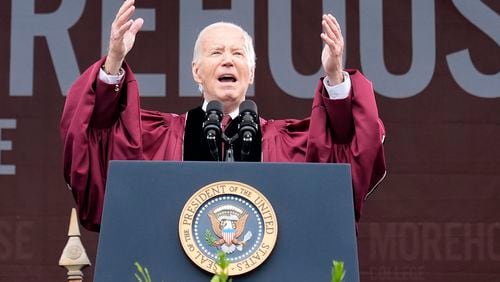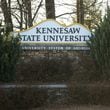Politics and questions of a possible conflict of interest are at center stage in a state Supreme Court case over charter school funding that has captured the attention of education leaders across the country.
With Georgia's reputation as a leading education reformer on the line, the state's highest court will rule in the coming months on the tug-of-war over power and money that has pitted seven school districts against the state in a fight over local control. The case has already raised a question over fair play.
Ties between Supreme Court Justice David Nahmias and Mike Bowers, attorney for Gwinnett County Public Schools, the lead district in the case, have some in education circles questioning a possible conflict of interest. Bowers, a former Georgia attorney general, is Nahmias' election campaign committee's co-chair and contributed $1,000 to his election bid on Aug. 1, finance disclosures show.
A committee Bowers chaired in 2009 recommended Nahmias, 46, the former U.S. attorney in Atlanta, for his seat on the state Supreme Court. Nahmias appeared on the short list of candidates that the Judicial Nominating Commission sent to the governor when former Chief Justice Leah Ward stepped down.
Neither Nahmias or Bowers see their relationship as an issue, but some parties in the case had been unaware of the ties and have concerns. The case's outcome could dismantle a network of non-traditional schools, leaving more than 10,000 students without campuses.
"People recuse themselves all of the time in government from making decisions on things that they are financially affected by or having fiduciary responsibility with. Commissioners recuse themselves, judges recuse themselves,” said BJ Van Gundy, a member of the Georgia Charter Schools Commission, the board at the center of the challenge. “It sounds like a conflict to me, but I would leave that up to the rules of the state Supreme Court.”
Nina Gilbert, head of school at Ivy Preparatory Academy, which is named in the case, said she only learned of the relationship after the case's Oct. 12 hearing.
"I sincerely hope that Justice Nahmias will be objective and fair regardless of his connection to any of the attorneys," she said.
The state Code of Judicial Conduct stipulates a judge should voluntarily disqualify himself or herself from a case "in which their impartiality might reasonably be questioned" or when the judge "has a personal bias" concerning a lawyer. Justices, however, do not have to recuse themselves if a lawyer who argues before the court also heads their election campaign.
“Lawyers are the folks who are the primary contributors to judges," said Bowers, adding that he doubts Nahmias knows that he was a contributor. "And from my experience, it doesn't make a bit of difference."
Bowers is one of 150 lawyers working to elect the justice. He also serves as one of the campaign's four co-chairs.
"The campaign and Justice Nahmias are abiding by all ethical and legal requirements," Nahmias spokesman Linton Johnson said.
Johnson noted that Bowers, since becoming campaign co-chair, has argued two other cases before the state Supreme Court. In those cases, Bowers prevailed on behalf of his clients – a Cobb County law firm that collected debts and was being investigated by the state and businesses with coin-operated amusement games. But in both cases, Nahmias joined dissenting justices who disagreed with the majority’s opinion.
In a recent interview, Nahmias said when he is at a fund-raiser, he leaves the room when attendees are asked to contribute to his campaign. Nahmias also said he does not make calls directly asking for donations and does not look at reports to see who has given money to his campaign.
“If you can avoid it, it’s the better course,” he said.
Johnson added that attorneys representing the state Department of Education, the charter schools commission and three charter schools did not ask Nahmias to recuse himself from the case.
"We know the case will be decided on the merits," said Bruce Brown, attorney for the charter schools.
The court will decide whether to uphold a Fulton County Superior Court ruling supporting the authority of the Georgia Charter Schools Commission to approve and fund charter schools. Commission-approved charters receive federal and state dollars, plus a hotly debated share of local matching funds, which come from the state allocations of the school districts that lose students to charter schools.
The court also will consider whether commission charters qualify as special schools as allowed by the state Constitution. If the court narrows the definition argued by Bowers that special schools are those only for special needs students, the existence of non-traditional schools across the state could be challenged. (As attorney general, Bowers twice championed the opposing argument that charter schools are special schools.)
“
Matt Wilson, who is running against Nahmias, said ties between Bowers and the justice are too close for comfort.
"It's so incredibly obvious that Mike Bowers, as chairman of Nahmias’ re-election committee, should never be arguing or appearing before him," Wilson said. "These political insiders just don’t get it."
If the court's opinion favors the seven districts, which also include Atlanta, DeKalb, Bulloch, Candler, Henry and Griffin public schools, the charter schools commission would be dismantled.
“Florida is the only place where an authorizer has been shut down because of a legal challenge,” said William Haft, a vice president of the National Association of Charter School Authorizers. “It certainly would be a disruption for the development of charter schools and for school reform.”






